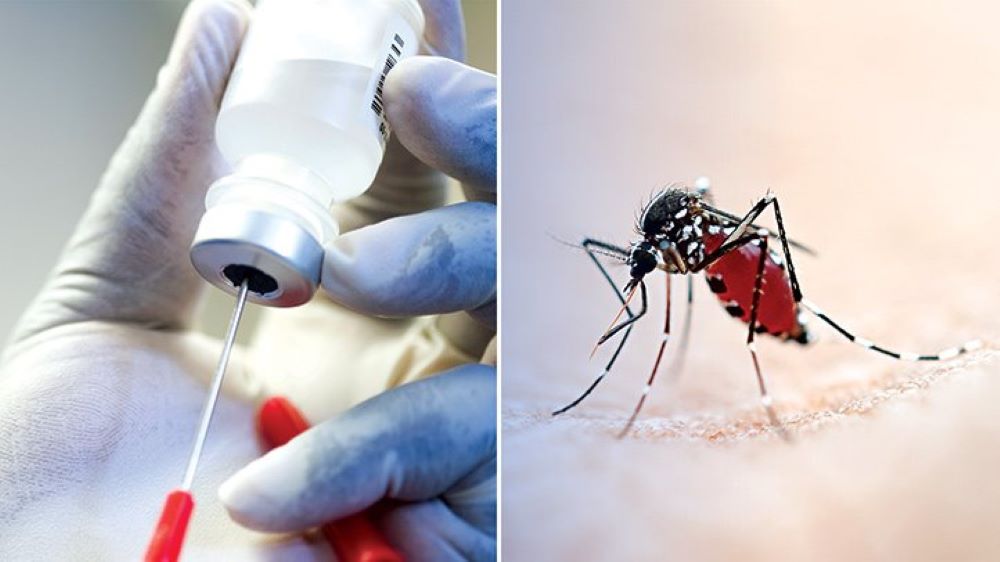
via Griffith University
Griffith University researchers are a step closer in the fight against malaria with the development of a broad-spectrum vaccine that can be freeze-dried making it suitable for deployment into malaria-endemic countries.
In a study published in mBio, Institute for Glycomics researchers further developed a whole parasite vaccine that targets the stage of the malaria parasite found in the blood.
“Our optimised vaccine incorporates killed blood-stage malaria parasites, lipids and additional synthetic compounds which enhances the protective immune response stimulated by the vaccine,’’ said lead researcher Dr Danielle Stanisic.
“In pre-clinical studies we showed that our vaccine induces a strong protection against the parasite by stimulating the immune system’s cell army – T cells and inflammatory cytokines – that help kill the parasites.”
“In what we believe to be the first of its kind for a whole parasite vaccine, it can be freeze-dried into a powder without losing its efficacy.”
Dr Stanisic said this had not been previously achieved with any whole parasite vaccine for malaria and was made possible by replacing the red cell membrane that normally surrounds the parasite with a synthetic lipid-based membrane.
“While it is not possible to freeze-dry and still preserve human red cells, it is possible to freeze-dry parasites within these synthetic membranes. Imagine just being able to add saline and inject into a person,” she said.
“This will greatly facilitate easy deployment into the field in malaria-endemic countries.”
Co-research lead Professor Michael Good AO said by including the whole blood-stage parasite in the vaccine, a broad range of parasite antigens are presented to the immune system, including antigens that are common between different parasite strains.
“This means that the whole parasite vaccine approach should induce a broad protective immune response against the multitude of parasite strains circulating in the field,’’ he said.
“We are very excited by these results which give us the green light to now test this new technology in human volunteers”
Malaria is a mosquito-borne infectious disease caused by Plasmodium parasites. It is endemic in 87 countries with more than 200 million cases each year, resulting 400,000 deaths, mostly children under the age of five.
Existing control strategies for the mosquito and malaria parasite are becoming increasingly less effective due to the resistance against insecticides and anti-malaria drugs.
“A highly effective malaria vaccine is urgently needed to reduce malaria disease and death and move towards the ultimate goal of eradication,’’ Professor Good said.
Director of the Institute for Glycomics, Professor Mark von Itzstein AO said it was a major breakthrough towards the delivery of an efficient malaria vaccine.
“This new malaria vaccine candidate presents a significant advance in the fight against a highly impactful disease,’’ he said.
“A major challenge in vaccine development, to prevent diseases such as malaria, is getting the vaccine in a long-lasting stable form to susceptible populations, such as those in Africa. This research now offers exactly the right solution to this challenge.”
The researchers plan to hold human clinical trials to evaluate this vaccine in 2022. It will then be ready to evaluate overseas in malaria endemic areas.
Original Article: Researchers develop broad-spectrum malaria vaccine
More from: Griffith University
The Latest Updates from Bing News & Google News
Go deeper with Bing News on:
Malaria vaccine
- Gov Otti’s Wife Champions Malaria Elimination Programme In Abia
Abia State governor's wife, Mrs Priscilla Otti, has decried the high burden of malaria in the state while committing to tireless effort towards achieving the ...
- Malaria – We’ve Barely Scratched The Surface
Malaria is frequently referred to as a disease of poverty. For many people, malaria is a daily reality that affects not only their health, but their mental and financial stability, family life, work, ...
- New monoclonal antibody vaccine slashes malaria risk in children
A recent study demonstrates that the monoclonal antibody-based vaccine L9LS is safe for children aged 6 to 10 and significantly reduces the risk of malaria infection and clinical symptoms by 70% and ...
- Mozambique: Government to introduce malaria vaccine in June
The Mozambican health minister, Armindo Tiago, has announced that a malaria vaccine will be introduced into the country’s health service in June of this year. According to the minister, who was ...
- R21 anti-malaria vaccine is a game changer: scientist who helped design it reflects on 30 years of research, and what it promises
More than 600,000 people die of malaria each year. With low-cost, very effective vaccines being deployed we should be able to get this down to 200,000 or less by the end of this decade then the ...
Go deeper with Google Headlines on:
Malaria vaccine
[google_news title=”” keyword=”malaria vaccine” num_posts=”5″ blurb_length=”0″ show_thumb=”left”]
Go deeper with Bing News on:
Malaria
- Tinubu's Aid, Who Engage S/e Communities With Measures To Eradicate Malaria
The Senior special Assistant to the president on Community engagement, south east, Mrs Chioma Nweze in partnership with World Health Organization, and Chestrad ...
- World Malaria Day: LAWMA Boss Makes Case For Clean Environment
The Managing Director/CEO of the Lagos Waste Management Authority (LAWMA), Dr. Muyiwa Gbadegesin, has underscored the importance of maintaining a clean environment, to combat the spread of malaria. He ...
- World Malaria Day: ClearlineHMO, Greenlife donate malaria aid to community
Speaking at the event held at the Oba Palace, General Manager, Sales and Marketing, Clearline HMO, Olaoye Olubukola, said the outreach to commemorate World Malaria Day was aimed at helping the ...
- New monoclonal antibody vaccine slashes malaria risk in children
A recent study demonstrates that the monoclonal antibody-based vaccine L9LS is safe for children aged 6 to 10 and significantly reduces the risk of malaria infection and clinical symptoms by 70% and ...
- Sarasota County prepares for mosquito season after last year’s malaria outbreak
As we inch closer to some of the rainiest months of the year, residents can expect to see more mosquitoes out and about.
Go deeper with Google Headlines on:
Malaria
[google_news title=”” keyword=”malaria” num_posts=”5″ blurb_length=”0″ show_thumb=”left”]










